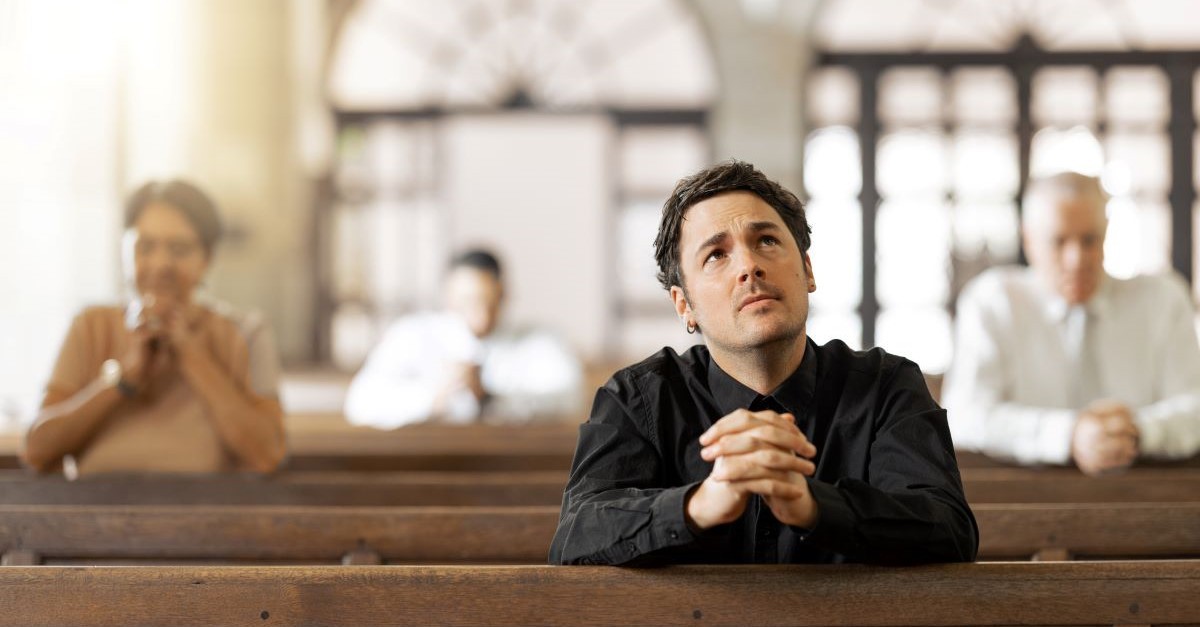
The Lord Jesus tells us, “No one can come to Me unless the Father who sent Me draws him; and I will raise him up on the last day” (John 6:44). Converting to Christianity means putting your faith in the Lord Jesus Christ. It’s not just about joining a religion—it’s about beginning a real, personal relationship with the God who made you and loves you.
Maybe you’ve felt a stirring in your heart, a longing for something more, or a need for peace that the world hasn’t been able to give you. That’s often how God begins to draw us to Himself. When you come to Jesus, you’re saying “yes” to grace, forgiveness, and a life made new—one where you are never alone, and where hope is secure, even in the hardest moments.
Photo credit: ©GettyImages/Javier Art Photography

What Does it Really Mean to Convert to Christianity?
Converting to Christianity means God has placed you into a right relationship with Him through the Lord Jesus Christ. This happens when a person puts their faith in Jesus.
Whether a person has no faith or their faith is tied up in a religion other than Christianity, becoming a Christian begins at a person’s “ground zero.” Ground zero is when people come to the end of themselves and/or the end of false belief systems, both according to God’s perfect timing and will.
Anything other than true Christianity judges a person as unsaved, and their eternal destiny is banishment to hell. The good news is becoming a Christian is a complete transfer from death to life (Ephesians 2:1-6; 1 John 3:14). For a Christian, the Bible tells us, “Therefore, being always of good courage, and knowing that while we are at home in the body we are absent from the Lord—for we walk by faith, not by sight—we are of good courage and prefer rather to be absent from the body and to be at home with the Lord.” Upon our earthly deaths, Christians’ bodies rest in the ground until the Lord returns, but their souls are immediately with Christ in heaven.
Becoming a Christian opens our hearts, spirits, and minds to the truths of our Creator and His Word. Because of what He’s revealed in his creation, no one can deny God exists (Romans 1:18-20). That’s God’s general revelation. God’s special revelation (Jesus Christ and the Scriptures) reveals God’s character and plan of redemption. The Holy Spirit works within a Christian to bring understanding of the Bible and who we are in Christ (John 16:13). A Christian realizes the Scriptures are all about the Person and work of Jesus Christ. Reading the Bible is a hunt for God’s treasures found within, and God uses our reverent fear of Him (Proverbs 9:10; Acts 9:31) to help us grow in the grace and knowledge of the Lord Jesus (2 Peter 1:2; 3:18).
For the fearful or cynical, Christianity is not a lack of freedom. Instead, it’s joyful freedom in Christ, knowing you are saved from God’s wrath forever and saved to a blessed fellowship with Him. The things you used to be are now realized as enslavement to sin and to the father of lies—Satan. Joy is no longer a fleeting concept; it’s reality, no matter what this earthly life brings. Why? Because we know the Lord of lords and King of kings, and we will be with Him forever.
Becoming a Christian means belonging to a forever family of those who exalt Christ above all else. If you are a new Christian, welcome to the family! The best is yet to come.
Photo Credit: ©iStock/Getty Images Plus/kevron2001

What Are the Steps to Convert to Christianity?
Conversion to Christianity is an acceptance and acknowledgement of who you are (a sinner) and who Christ is, Savior and Lord. Among other glorious titles, Jesus Christ is:
- The Son of God (Mark 1:1)
- God incarnate (John 1)
- The prophesied Messiah (Daniel 9:25-26; John 1:41)
- The Lamb of God (John 1:36)
- Savior of the world (John 1:29)
- The Way, and the Life, and the Truth (John 14:6)
- Lord of all (Acts 10:36)
- The gospel of God/the kingdom (Mark 1:1; Galatians 1:3-7)
The gospel guides us to faith by grace alone in Christ alone through faith alone for His glory alone. In the beginning, God created a perfect world with two perfect humans (Adam and Eve). They were in perfect fellowship with God—their Creator—until sin entered their hearts through Satan’s influence. When Adam fell (sinned), his role as the federal head of humanity caused all humanity to be born into sin (Romans 3:23) and out of a right fellowship with God.
Our gracious God, from eternity past, knew this would happen, and in Genesis 3:15, we read what is called the protoevangelium (the first gospel). God would send a Savior-the Messiah so man could be forgiven through Him. God instituted the law through Moses to reveal sin (Romans 7:7-25), and so man would understand he could never be righteous before God in his unsaved state.
Jesus, God’s Son, came as a man—the second Adam—to fulfill all the law and the prophets (Matthew 5:17). His atoning work on the cross is a propitiation (satisfaction) for our sins. Those who believe in and who have surrendered to Jesus in repentance* and faith are saved from God’s righteous wrath. *Repentance is an acceptance of what God says about you and what He reveals about Himself.
God looks at every unsaved person as He looked at Adam, a sinner unable to save himself by his merit or works. When God regards Christians, however, He sees Jesus, because Christians are clothed in Christ (Galatians 3:27), and are seen as righteous before God. We trust Him with our lives because He is the only One who can save and sustain us.
Photo credit: ©Getty Images

Do You Have to Be Perfect or Clean Up Your Life before Coming to God?
One of the many beautiful truths of Christianity is God does not call the righteous, but sinners (Mark 2:17; Luke 5:32). Sinners are a mess; but thank God for Jesus, Who cleans us up. Pastor Justin Perdue reminds us, “The only thing we need to come to Jesus is to be a sinner.” You see, when we try to clean ourselves up, we always fail. It’s like trying to obey all the commandments. We cannot because only a perfect and sinless Man can perfectly obey the law. As we have seen, the law reveals sin, and it commands us to do what we cannot. The law says, “do,” while the gospel says, “done.” Jesus did everything the law requires—He’s the only One who could, and that includes cleaning us up when we become Christians. He endured the cross amid the jeers of sinful men, and He died and then rose again to glory (John 19-20; John 13:31-32). Jesus sits at the right hand of the Father (Acts 2:33), and He’s interceding for us (Romans 8:34) because we are still sinners (1 John 1:9), yet clothed in the righteousness of Christ (Ephesians 6:14; Romans 3:22).
Photo credit: ©Getty Images/Tinnakorn Jorruang

What Happens after You Say "Yes" to Jesus?
Get ready, because your whole world/life will change, and for the better! Suddenly, you are justified in the sight of God because of Christ. You are clean before Him because of what Jesus did for you. At the very moment of conversion, Christ begins His sanctifying work in you. Philippians 1:6 assures us, “For I am confident of this very thing, that He who began a good work in you will perfect it until the day of Christ Jesus.” It’s Christ’s work in us and not anything we do that sanctifies (purifies) us. And sanctification is an ongoing process until Christ returns or until He calls us home.
You now have the Holy Spirit indwelling you as a seal of your inheritance (Ephesians 1:13). You belong to Christ and no one and nothing can snatch you out of His hands (John 10:28-29) or thwart His plans for your life (Job 42:2).
You are now a member of the kingdom of God, which is an “already and not yet” reality. For now, Christ’s kingdom is invisible—a realm known only to Christians where we live and move and have our being in Christ (Acts 17:28). It’s a spiritual realm, yes, but it’s reality. The “not yet” refers to a future time when Christ will return and physically reign over all of creation. And Christians who are adopted by God as children (Ephesians 1:5), will reign with Him (2 Timothy 2:11-13).
A number of other religions say they are Christian, when in truth they aren’t. When we are saved, we are indwelt by the Holy Spirit, Who gives us guidance into all truth and discernment. False teachers who claim to be Christian do one or more of the following:
- proclaim a false gospel (declaring a false Jesus as described in 1 John 4:1-3)
- distort the nature of salvation (Galatians 1:6-12, 5:2-4)
- advocate what God condemns as sinful (Jude 4)
- distort core doctrines about God (such as the Trinity)
- adds to what the Bible says (following traditions/the doctrines of man)
The Bible is the absolute standard for all teaching; avoid anything that departs from its truth.
A warning for all new Christians has to do with upcoming battles. Satan hates everything to do with Jesus Christ, including those who are transferred out of his earthly kingdom (Ephesians 2:2) and into the light, life, and truth-filled kingdom of God. His demons will try every tactic they can to cause you to falter, including making you doubt your salvation. Never forget Christ has you covered! He is our full armor (Ephesians 6:10-20). He has overcome Satan (John 16:33), and greater is Christ in you than he (the devil) who is in the world (1 John 4:4). We have the confidence of Christ in us and for us. Therefore, rejoice!
Photo credit: Joshua Earle/Unsplash

Taking the First Step toward New Life as a Christian
Many new Christians report an overwhelming sense of peace and joy the very moment they are saved by the Lord. Hallelujah! Praise God for new life in Christ. Share your good news with other Christians so you can rejoice together.
The Christian life is not easy but it’s rewarding. Everything we do as Christians is to be done as an outflow of our love for Christ and what He has done for us (Colossians 3:23-24). Always remember, our good works don’t “keep” us saved. Christ has done it all, therefore rest in Him—every day.
Our daily Christian lives include:
- Praying. Remember, prayer is the vehicle God has chosen for us to communicate with Him. Be yourself and let everything come out to Him in your voice, not some rote repetition you’ve heard as the way to pray. The Lord wants our broken and contrite hearts poured out before Him. You have been forgiven, and you now have eternal life. Let that be a starting point as you prepare to pray.
- Bible reading and study. Bible translations abound, and you may have a hard time selecting what Bible to read. A few recommendations may be found here. You can also compare translations’ verses here.
- Finding a solid Bible-believing and teaching church. Many churches post their weekly sermons online. Do take the time to watch some to determine your preference or style. But don’t compromise on the church’s doctrinal position on the authority of Scripture and the church’s regular proclamation of the gospel and its exaltation of Christ.
- Connecting with mature Christians who can mentor you on the exciting journey of faith. If you don’t have a relationship with a Christian, chances are you will be able to connect within the church you decide to attend. Pray for the Lord to direct you where He wants you to be.
The Christian life is one of joy, sacrifice, rest, and rewards.
- Joy in being in Christ (Romans 6:11).
- Sacrificial living (Romans 12:11).
- Rest in Christ (Hebrews 4:10).
- Promised rewards (Colossians 3:23-24).
We’ll end with Paul’s doxology from his epistle to the church in Rome: “Now to Him who is able to strengthen you according to my gospel and the preaching of Jesus Christ, according to the revelation of the mystery which has been kept secret for long ages past, but now is manifested, and by the Scriptures of the prophets, according to the commandment of the eternal God, has been made known to all the Gentiles, leading to obedience of faith; to the only wise God, through Jesus Christ, be the glory forever. Amen.” (Romans 16:25-27).
Additional Resources:
What Does it Mean to Say "I am a Christian"?
What Is the Sinner's Prayer?
Can a True Christian Ever Lose Their Salvation?
What Is a Christian?
How to Become a Christian
How Do We Pray to God?
Photo credit: ©GettyImages/PeopleImages

Originally published Monday, 12 May 2025.
